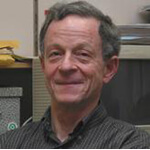
Bacteriophages, also known as phages, are viruses that attack and often kill bacteria. Phages are the most numerous organisms in the environment, often reaching levels of 10 billion or more per quart of ocean water and 100 billion or more per pound of soil. Phages are harmless to people as far as anyone knows.
Now, phage gene hunters, including Philip Serwer, Ph.D., Stephen C. Hardies, Ph.D., and Borries Demeler, Ph.D., of the department of biochemistry at The University of Texas Health Science Center at San Antonio, are busy isolating many unusual phages from soil at the King Ranch in South Texas. The project is funded by the Robert J. Kleberg Jr. and Helen C. Kleberg Foundation.
“We are investigating the growth patterns of unusual phages, and also the genes of phages and how the genes are related to each other,” said Philip Serwer, Ph.D., professor of biochemistry at the Health Science Center and principal investigator on the project. “Phages are already known to have the most diverse genomes known. The research will improve understanding of ecology and should one day lead to new vaccines, gene therapy delivery systems, antibiotics, and improved use of phages themselves as agents to kill bacteria. Products could include medications to treat wound infections and diseases such as anthrax and tuberculosis, and others. Some of the science has already progressed so rapidly that the potential has not yet been digested.”
In May, researchers from the Health Science Center and other institutions converged on the South Texas city of Kingsville near the King Ranch for the 2006 Texas/Evergreen Phage/Virus Genomics and Ecology Meeting. The meeting was held at the Caesar Kleberg Wildlife Research Center at Texas A&M University-Kingsville.
“Our work at the King Ranch has stimulated us to ask whether potential uses exist for phages in controlling infections of ranch animals,” Dr. Serwer said. “Others at the conference are investigating phages from various environments including other ranches, the oceans and thermal aquifers.”
For example, talks at the conference described preliminary work at the U.S. Food and Drug Administration (FDA) and the University of Wyoming to use phages to clear bacteria like E. coli 0157 out of infected cattle. This is an important issue to the FDA because E. coli 0157 doesn’t hurt cattle, but can be deadly to people.
Advances in phage research might even help a great horse like Barbaro, the Kentucky Derby winner that broke his leg at the Preakness. Perhaps phages will be useful to stop infections that prevent a horse like Barbaro from healing.
“The Kleberg Foundation’s generosity makes our environmental phage research program possible, and its grant also supported the conference, which arguably was one of the top scientific events in Kingsville’s history,” said Francisco G. Cigarroa, M.D., president of the Health Science Center. “I was very pleased that Mrs. Helen Kleberg Groves, just back from a trip to Australia, was able to return in time to see the interesting science that the Foundation has funded.”
Today at the Health Science Center, the Kleberg Foundation funds tuberculosis, HIV/AIDS and virus research, and the Kleberg Medical Scholars program.
The Kleberg Medical Scholars are outstanding Health Science Center resident physicians who see patients and conduct research at the Health Science Center’s Regional Academic Health Center in Harlingen. The Kleberg Medical Scholars program is supported by a $1.46 million grant from the Kleberg Foundation. The Kleberg Medical Scholars are studying diabetes, streptococcus infection and nutrition/obesity, among many other topics.
“The Robert J. Kleberg, Jr. and Helen C. Kleberg Foundation is proud to support The University of Texas Health Science Center at San Antonio in its focus to conduct research that is very much needed for South Texas,” Mrs. Groves said. “This is certainly a worthy cause.”
Almost 60 researchers from around the world attended the recent conference, which was organized by Drs. Serwer and Hardies of the Health Science Center and Elizabeth Kutter, Ph.D., of The Evergreen State College in Olympia, Wash.

